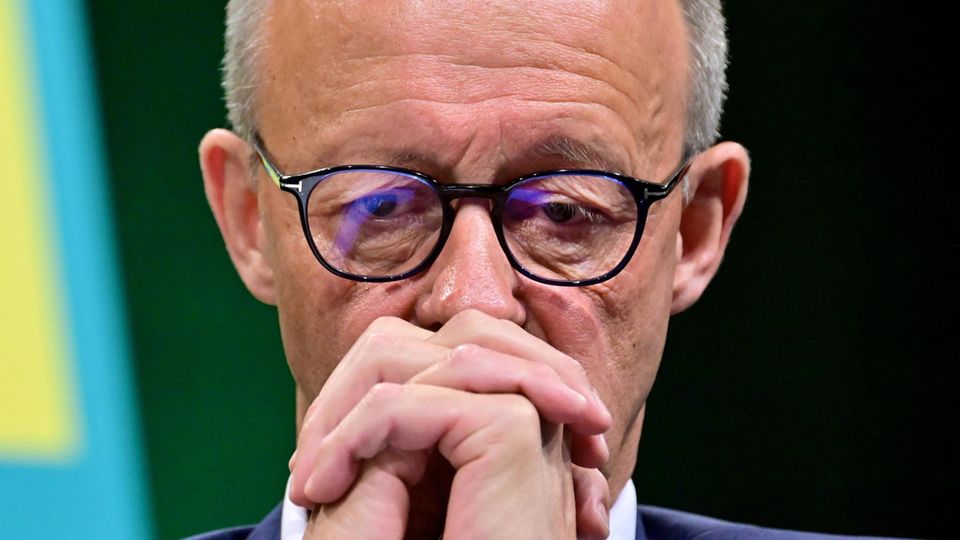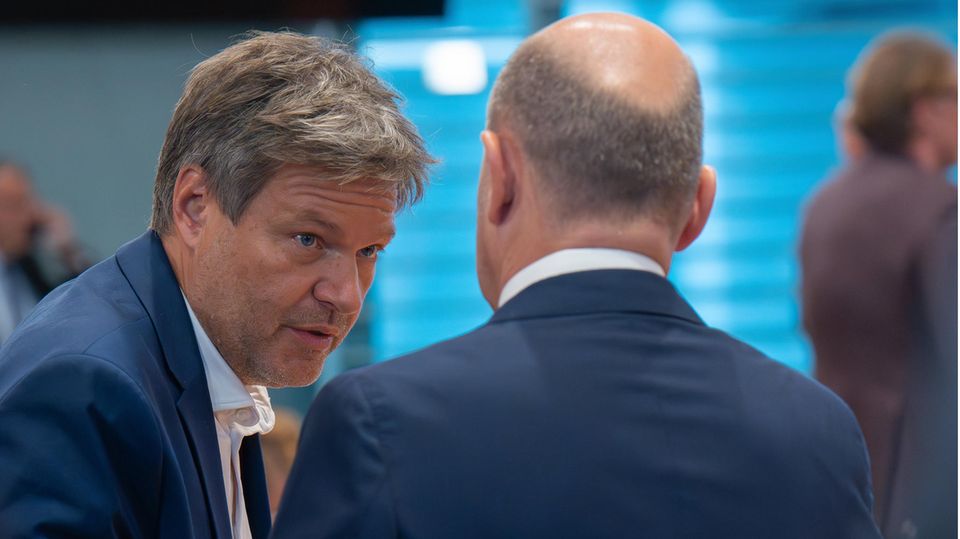Carsten Linnemann has been acting like the CDU’s shadow general secretary for a long time. He is now officially in office. Who is the man who should help Friedrich Merz out of the mess?
He has always defended him. Has rejected any criticism. Has praised the good cooperation, long after everyone could see that little was going on between the two, especially nothing good. That’s over now. Friedrich Merz has made his decision, it wasn’t easy for him, but it has to be: The CDU boss is replacing his general secretary. Mario Czaja, 47, has to go after just a year and a half.
The new man at Merzen’s side is the least surprise of this all in all somewhat surprising maneuver. Carsten Linnemann, 45, previously one of five deputy party leaders, has been acting like a kind of shadow general for some time. As head of the Policy Commission, he is driving the renewal of the content of the CDU. Now he’s taking on a position he’s always dreamed of. A man who has reached his dreams. for now.
In political Berlin, he is known as the Christian Democratic version of ex-SPD leader Sigmar Gabriel: He has hardly discovered a topic, announced an idea, started an initiative, and the next one follows right away. Not all of them are new. Which doesn’t stop Linnemann from selling them like this.
He called for a community year for everyone and compulsory pre-school for children who hardly speak German. He has written books on the middle class and edited one on political Islam. And he has dealt with topics that others avoid because they can stir up their own supporters: tax and pension policy.
In a party where most people just want to govern, Linnemann is one of those who want to think a little now and then. Who confront their party friends with gaps in content and open flanks: What should the Union implement when it governs?
He has admonished and warned, always in vain
For many years they didn’t want to know much about it in the party. Angela Merkel ruled for four long legislative periods. It was a time when Germans lived well and happily. And in which few in the CDU wanted to rack their brains about what could actually come after that.
Linnemann has admonished and warned, always in vain. He was smiled at, sometimes even mocked – until the election night in September 2021, which proved him right. But by then it was too late. That’s where the damage was done. The Union had lost the election, an unlucky candidate, an uninspired program – and fell deep into a crisis of meaning.
And Carsten Linnemann? Really wanted to get started now. He formulated fifteen ideas for better politics, packed them into a book and gave the whole thing a title that should pick up as many people as possible where he suspects they are: “They don’t tick right!: Why politics has to rethink.”
In the past it would have stayed that way. Linnemann once again had a few ideas. Party fossil Wolfgang Bosbach likes this. Some media reports. That’s it. Unlike before, however, the Union is now in the opposition. And even there, despite the traffic light misery, not particularly successful. She could use someone like Linnemann there.
The 45-year-old, who is still extremely young but not official, grew up as the son of a bookseller family in Schwaney, a small town near Paderborn. To this day he represents the constituency there, four times in a row he has won it for the CDU – in the last federal election with almost 50 percent of the first votes. Linnemann studied business administration, did his doctorate in economics with a scholarship from the Konrad-Adenauer-Foundation and worked, among other things, as an assistant to the chief economist at Deutsche Bank before moving into the Bundestag for the first time in 2009. From 2013 to 2021 he was head of the SME Union, the neoliberal mastermind of the Erhard heirs. He came across as correspondingly cold at the time, like a brash business administration boy.
The task facing the new Secretary General is anything but trivial, to paraphrase Angela Merkel, which Linnemann would certainly not like at all. Thanks to her course of “asymmetric demobilization,” he considers the former chancellor and ex-chairman of his party to be largely responsible for the fact that the CDU has lost its profile, its clear programmatic edge and thus its appeal among conservative clientele. Merkel put the voters to sleep in order to secure her power – and stupidly so did the party. At least that’s how the sharp-sighted and sharp-tongued Linnemann sees it.
“We weren’t good enough anymore”
Linnemann wrote down what his most important job will be six years ago. If the CDU doesn’t want to lose its character as a people’s party, it “must give itself an unmistakable signature tune again. It has to say clearly again what it stands for and what it doesn’t. It has to say goodbye to the so-called ‘asymmetric demobilization’, in which By avoiding clear positions, an attempt is made to keep the potential voters of the political opponent away from the ballot box or to win them over.”
The sentences come from another book from Linnemann’s think tank: “They do what they want anyway – anger, frustration, uneasiness. Politics has to get better.” Although one can say with some justification: anger, frustration and uneasiness had already built up in himself, about his party, or better: about his party leadership.
“We need credible characters who sometimes draw attention to themselves with unusual solutions away from the mainstream,” postulated Linnemann, “edgy profiles”.
It all sounded like it was self-described. In any case, it can attract attention, much more than its unfortunate predecessor. Unmistakable signature tune too. Linnemann prefers the loud horn instead of the rhetorical piccolo. Any examples? Please:
“Merkel made blatant mistakes.”
“The traffic light must stop telling fairy tales.”
“We weren’t good enough anymore.” Where “we” stood for the CDU after the failed federal election in 2021.
After the Leisetreter Czaja, it’s now a loudspeaker again. It’s been a long time since the CDU had a general secretary from the old Heiner Geißler school, who always followed the motto: Attack is the best attack, yell at them.
But maybe that’s the right strategy. Linnemann was able to observe with his predecessor that a quiet general is of little use in the opposition. From the start, Czaja was unfamiliar with the new task. And probably just barely misses the Secretary-General category, for which they have reserved the term “mistake” in the Union vocabulary.
With Carsten Linnemann, Merz is trying the opposite model
The former Berlin health senator Czaja had just managed the feat of wresting the direct mandate from the leftist Petra Pau deep in East Berlin in the federal elections. Now he should have helped Merz give the party a softer image, a side that the party leader himself lacks to this day. Dashing, Merz can do that best himself. As a complementary duo, however, it did not harmonize.
It had long been clear that things were not going well. That someone else has long since warmed up – also. Linnemann saw Czaja’s weaknesses early on, but avoided positioning himself internally against the general secretary. In no way should it appear as if he wanted Czaja’s job. Now he has it.
With Linnemann, Merz tries the opposite model: the clone at his side. A staunch economic politician, sharp commentator, from North Rhine-Westphalia, from an area not far from Sauerland – three times like Merz. Is the “congruent” experiment now following the “complementary” model?
Like the party leader, Linnemann rarely shies away from conflict and seeks confrontation with the opponent – even within the party. During his time as head of the economic wing, he regularly antagonized the social committees of the CDU. He still has to prove that he can integrate. On the other hand, he is loyal – at least to Merz. Linnemann supported the Sauerlander in all candidatures for the presidency, but initially dropped out as general secretary precisely because of this closeness. Now two very similar figures characterize the image of the CDU. This can be a good thing, but it is not without risk.
The change does not come as a surprise to Merz’s confidante. Internally, the party leader had recently made no secret of his disappointment with his general secretary. He thought he was too pale and not aggressive enough. Merz is said to have been annoyed by the fact that Czaja has hardly had a substantive initiative since he took office. This is one of the reasons why the chairman himself sometimes acted like a general secretary – which in turn did little to help his public image.
For Merz, the change is also a personal defeat. With Czaja at his side, he wanted to make the CDU more diverse, to show the outside world that he could also integrate those who were politically different from his own. This experiment has now failed.
Collaboration: Andreas Hoidn-Borchers, Veit Medick, Jan Rosenkranz




